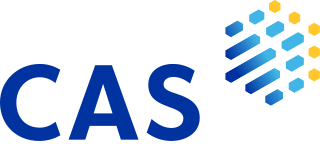
arXiv is an open-access repository of electronic preprints and postprints approved for posting after moderation, but not peer review. It consists of scientific papers in the fields of mathematics, physics, astronomy, electrical engineering, computer science, quantitative biology, statistics, mathematical finance and economics, which can be accessed online. In many fields of mathematics and physics, almost all scientific papers are self-archived on the arXiv repository before publication in a peer-reviewed journal. Some publishers also grant permission for authors to archive the peer-reviewed postprint. Begun on August 14, 1991, arXiv.org passed the half-million-article milestone on October 3, 2008, had hit a million by the end of 2014 and two million by the end of 2021. As of April 2021, the submission rate is about 16,000 articles per month.

The Open University (OU) is a public research university and the largest university in the United Kingdom by number of students. The majority of the OU's undergraduate students are based in the United Kingdom and principally study off-campus; many of its courses can also be studied anywhere in the world. There are also a number of full-time postgraduate research students based on the 45 hectares university campus in Milton Keynes, where they use the staff facilities for research, as well as more than 1,000 members of academic and research staff and over 2,500 administrative, operational and support staff.

JSTOR is a digital library of academic journals, books, and primary sources founded in 1994. Originally containing digitized back issues of academic journals, it now encompasses books and other primary sources as well as current issues of journals in the humanities and social sciences. It provides full-text searches of almost 2,000 journals. Most access is by subscription but some of the site is public domain, and open access content is available free of charge.

Open access (OA) is a set of principles and a range of practices through which research outputs are distributed online, free of access charges or other barriers. With open access strictly defined, or libre open access, barriers to copying or reuse are also reduced or removed by applying an open license for copyright.
BioMed Central (BMC) is a United Kingdom-based, for-profit scientific open access publisher that produces over 250 scientific journals. All its journals are published online only. BioMed Central describes itself as the first and largest open access science publisher. It was founded in 2000 and has been owned by Springer, now Springer Nature, since 2008.

Chemical Abstracts Service (CAS) is a division of the American Chemical Society. It is a source of chemical information and is located in Columbus, Ohio, United States.

Monthly Notices of the Royal Astronomical Society (MNRAS) is a peer-reviewed scientific journal covering research in astronomy and astrophysics. It has been in continuous existence since 1827 and publishes letters and papers reporting original research in relevant fields. Despite the name, the journal is no longer monthly, nor does it carry the notices of the Royal Astronomical Society. MNRAS publishes more articles per year than any other astronomy journal.

The Social Science Research Network (SSRN) is a repository for preprints devoted to the rapid dissemination of scholarly research in the social sciences, humanities, life sciences, and health sciences, among others. Elsevier bought SSRN from Social Science Electronic Publishing Inc. in May 2016. It is not an electronic journal, but rather an eLibrary and search engine.
An article or piece is a written work published in a print or electronic medium, for the propagation of news, research results, academic analysis or debate.
PubMed Central (PMC) is a free digital repository that archives open access full-text scholarly articles that have been published in biomedical and life sciences journals. As one of the major research databases developed by the National Center for Biotechnology Information (NCBI), PubMed Central is more than a document repository. Submissions to PMC are indexed and formatted for enhanced metadata, medical ontology, and unique identifiers which enrich the XML structured data for each article. Content within PMC can be linked to other NCBI databases and accessed via Entrez search and retrieval systems, further enhancing the public's ability to discover, read and build upon its biomedical knowledge.

The Public Knowledge Project (PKP) is a non-profit research initiative that is focused on the importance of making the results of publicly funded research freely available through open access policies, and on developing strategies for making this possible including software solutions. It is a partnership between the Faculty of Education at the University of British Columbia, the Canadian Centre for Studies in Publishing at Simon Fraser University, the University of Pittsburgh, Ontario Council of University Libraries, the California Digital Library and the School of Education at Stanford University. It seeks to improve the scholarly and public quality of academic research through the development of innovative online environments.

HathiTrust Digital Library is a large-scale collaborative repository of digital content from research libraries including content digitized via Google Books and the Internet Archive digitization initiatives, as well as content digitized locally by libraries.

The National Library of Economics is the world's largest research infrastructure for economic literature, online as well as offline. The ZBW is a member of the Leibniz Association and has been a foundation under public law since 2007. Several times the ZBW received the international LIBER Award for its innovative work in librarianship. The ZBW allows for access of millions of documents and research on economics, partnering with over 40 research institutions to create a connective Open Access portal and social web of research. Through its EconStor and EconBiz, researchers and students have accessed millions of datasets and thousands of articles. The ZBW also edits two journals: Wirtschaftsdienst and Intereconomics.

Academia.edu is a for-profit open repository of academic articles free to read by visitors. Uploading and downloading is restricted to registered users. Additional features are accessible only as a paid subscription. Since 2016 various social networking utilities have been added.
An open-access mandate is a policy adopted by a research institution, research funder, or government which requires or recommends researchers—usually university faculty or research staff and/or research grant recipients—to make their published, peer-reviewed journal articles and conference papers open access (1) by self-archiving their final, peer-reviewed drafts in a freely accessible institutional repository or disciplinary repository or (2) by publishing them in an open-access journal or both.

CORE is a service provided by the Knowledge Media Institute based at The Open University, United Kingdom. The goal of the project is to aggregate all open access content distributed across different systems, such as repositories and open access journals, enrich this content using text mining and data mining, and provide free access to it through a set of services. The CORE project also aims to promote open access to scholarly outputs. CORE works closely with digital libraries and institutional repositories.

Sci-Hub is a shadow library website that provides free access to millions of research papers, regardless of copyright, by bypassing publishers' paywalls in various ways. Unlike Library Genesis, it does not provide access to books. Sci-Hub was founded in Kazakhstan by Alexandra Elbakyan in 2011, in response to the high cost of research papers behind paywalls. The site is extensively used worldwide. In September 2019, the site's operator(s) said that it served approximately 400,000 requests per day. In addition to its intensive use, Sci-Hub stands out among other shadow libraries because of its easy use/reliability and because of the enormous size of its collection: a 2021 study estimated, that Sci-Hub provided access to 95% of all scholarly publications with issued DOI numbers, and on 15 July 2022 Sci-Hub reported that its collection comprises 88,343,822 files.

Shodhganga : a reservoir of Indian theses is a digital repository of theses and dissertations submitted to universities in India.

The idea and practise of providing free online access to journal articles began at least a decade before the term "open access" was formally coined. Computer scientists had been self-archiving in anonymous ftp archives since the 1970s and physicists had been self-archiving in arXiv since the 1990s. The Subversive Proposal to generalize the practice was posted in 1994.
The Open Knowledge Repository is the official open-access repository of the World Bank and features research content about development. It was launched in 2012, alongside the World Bank's Open Access Policy and its adoption of the Creative Commons Attribution license for all research and knowledge products that it publishes, which collectively made the World Bank the first international organization to completely embrace open access. The repository collects the intellectual output of the World Bank in digital form, disseminates it, and preserves it long-term.














